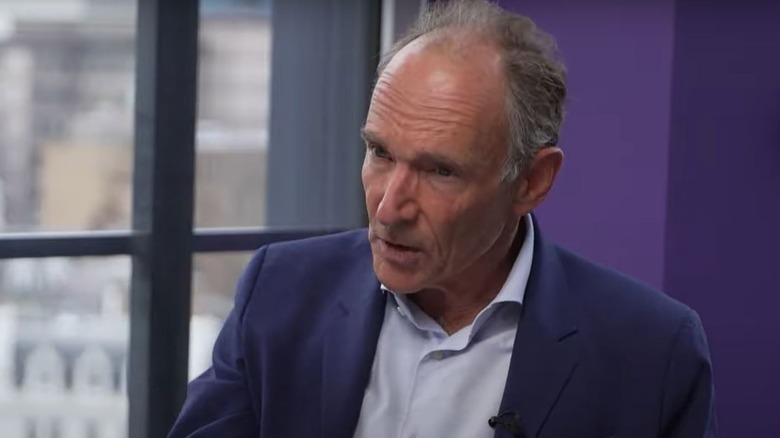Where Is Tim Berners-Lee, The Inventor Of The World Wide Web, Today?
Looking at how the internet has changed society to the point of molding it head to toe, how do you figure the internet's creator feels about it? Is he hanging his head in endless sorrow at how the world's most revolutionary tool of information democratization has been reduced to cat memes, self-aggrandizing social media influencers, and society-fracturing echo chambers algorithmically driven by ad bucks? Okay, maybe that's too harsh (maybe). After all, Sir Tim Berners-Lee seemed to be pretty upbeat about the whole thing during his Internet Hall of Fame induction. And as the announcer says, he's the guy who "invented the world wide web."
But hang on, didn't Al Gore invent the internet? Not quite. That's just a long-standing joke that circulated ages ago. Gore was more of a business casual Greta Thunberg prototype who also took planes, as his 2006 climate change-addressing documentary "An Inconvenient Truth" attests. Al Gore did, however, pave the governmental way for the development and expansion of the "Information Superhighway" going back to his time as a congressman in the 1970s, as the Internet Hall of Fame describes.
Tim Berners-Lee is the one who developed the actual technology that forms the backbone of the internet, specifically the connection between individual computers (clients) and the data processing hubs they communicate with (servers). As the Internet Hall of Fame again describes, Berners-Lee created HTTP technology for grabbing data, URLs, HTML code, and more. Since then he's been advocating heavily for a transparent, fairer internet for all.
A world-changing CERN project
By the time the 1980s rolled around, folks like futurist and writer Arthur C. Clarke had long predicted the rise of the internet, as he did in a 1964 BBC Horizon documentary. But aside from knowing that satellites would allow instantaneous, global communication using computing devices of some type, other technological specifics remained less clear.
That's when Tim Berners-Lee, an Oxford graduate and independent IT consultant, headed to CERN, the world's premier particle physics research institution in Switzerland. As a CERN history mini-documentary says, Berners-Lee was hired to unify all of CERN's disparate computers under one system so that they and their users could communicate with each other easily and at a distance. Nowadays everyone takes computer-to-computer communication for granted. But as Berners-Lee puts it in the documentary, "It used to be difficult to explain what the web would be like, now it's difficult to explain why it was difficult."
As Berners-Lee's Internet Hall of Fame biography explains, Berners-Lee built a "what-you-see-is-what-you-get" text editor to use with the world's first client-server combo, which he also built. It took two years for him to bring the fledgling "WorldWideWeb," as it was called, online. He finished the project by 1993, taking time to incorporate feedback from users across the already burgeoning global internet. For his work, Berners-Lee not only gained the financial ability to move on to other projects, but in 2004, Queen Elizabeth II named him a Knight Commander, Order of the British Empire (KBE). He also won the Turing Award in 2016, an award dubbed the "Nobel Prize in Computing."
A Magna Carta for the digital age
Internet creator Tim Berners-Lee hasn't sat on his laurels after building one of humanity's most civilization-changing pieces of technology. He's been relentlessly at work forming business after foundation after institute while doing interviews at TV stations like CNBC International TV and news sites like Wired, as well as giving TED Talks and more. Much of his work revolves around one, singular notion: ensuring that the internet remains a force for learning and open communication, not usury and censorship. As The Guardian quotes him in 2019, "We could end up with a digital dystopia if we don't turn things around. It's not that we need a 10-year plan for the web, we need to turn the web around now."
In his 2014 TED Talk Berners-Lee talks about crafting a new digital Magna Carta, currently readable on Contract for the Web. He discusses how the internet allows folks to talk to anyone anywhere, but government intervention and censorship mean that the internet is far less open and free than it seems. Berners-Lee also talks about a now well-known point of modern despair, namely the corporate centralization of internet communication. Social media "silos," he states, consolidate people under their umbrella and act as relationship intermediaries. This makes things simpler for internet users but helps perpetuate the internet's "filter bubble," where folks only come across what they've already decided to know and believe. " ... [W]e love it when we're bathed in things we like to click on," he very accurately states in the 2014 TED Talk.
Rebuilding a trustworthy internet
The first thing that Tim Berners-Lee did in 1994 after inventing the internet at CERN was immediately found the World Wide Web Consortium (W3C), a collaboration between early internet users to create simple ethical standards for the internet like, "The web is designed for the good of its users." Later on in 2009, Tim Berners-Lee co-founded the World Wide Web Foundation, an organization with the similar goal of "seek[ing] to ensure the Web serves humanity by establishing it as a global public good and a basic right."
As Berners-Lee says in his 2014 TED Talk about drafting a Magna Carta for the internet, 5% of the world's population was using the internet by 2000, only seven years after it went live. By 2007 that number had jumped to 17%. In 2012, Berners-Lee founded the Open Data Institute (ODI), which acts as a mediator between governments, businesses, charities, research institutions, etc., to create an "open, trustworthy data ecosystem" for the internet.
As if this wasn't enough, in 2018 Berners-Lee co-founded Inrupt, a company that launched the open-source platform Solid, which gives power back to users regarding how their personal data is stored. Solid — which anyone can use — creates private "pods" for user data that keep data safe, private, and most importantly, therefore, unable to be sold. Finally, Berners-Lee also spends time on the U.K. government's Public Sector Transparency Board, a segment of government dedicated to upholding "transparency of central and local government."



